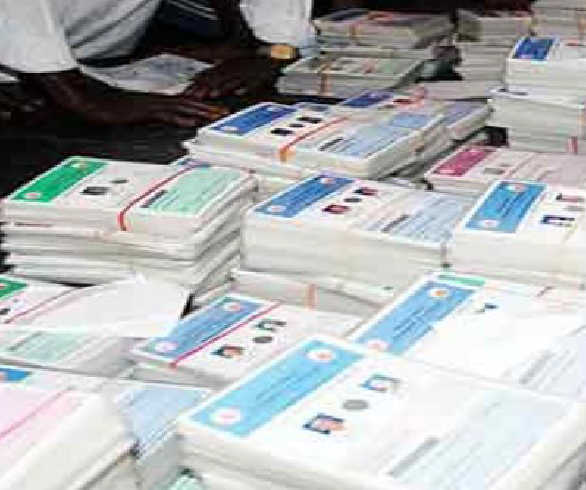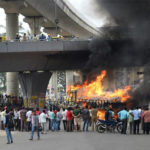Removing bogus ration cards issued , a move for political gain?

A Rising subsidy bills and challenges of sourcing food grains has been a huge task . Apart from delisting bogus ration cards issued in the past under political pressure , the Karnataka is now working at targeted supply of PDS rations.
When the present government led by rode to power in 2013 on Re1 per/kg of grains for Below Poverty Line (BPL) families it found itself in a spot as over 80% of the population in the state was registered under BPL category. Over 1 crore of the 1.31 crore households in the state were registered under the poor category. Sustained efforts to pruning and criminal action against the bogus card holders saw a decline in the number to below 80 lac households. Even this is high by Government standards as government believes that the number of BPL families in the state is mere 44 lacs.
Challenged with a subsidy bill of over 2300 crores in 2014-15 the Karnataka government launched several methods to cut subsidy by linking electricity bills and Gas connections ( as Supreme Court had prohibited mandatory usage of Aadhar during the period) .
While weeding out bogus BPL cards may have been half the battle won in the game. The real challenge that the Food and Civil Supplies department has identified is the pilferages and reselling of the subsidized rations. A study by Bengaluru based think tank identified that despite the efforts in the direction even now Karnataka loses over 145 crore Rs in pilferages .
What started off as a pilot project a few months ago threw up some challenging data. the Food and Civil Supplies Department tested a method of monitoring supplies of kerosene by issuing coupons for dispensation of kerosene. “When we started the experiment in April 2016, the core area of Bengaluru (prior to BBMP) had a total of 1,64,000 cards registered for kerosene. But with the implementation of coupon system, the number of cards came down to a mere 12,000 cards in July 2016, suggesting over 1.5 lakh people despite LPG connection took kerosene and allowed it into the black market” said U T Khader , Food and Civil Supplies minister of the state speaking to policy pulse.
It is from here that the concept of the IVRS based coupon generation started. From this month onwards consumers can avail of PDS coupons over phone. Simplifying the procedure all that one has to do is dial 161 and then press 4. On getting a response the consumer has to type the Aadhaar number and a unique number will be sent to the registered mobile phone. The consumer when picking rations have to share the unique number with the retailer. “ It’s with an objective to curb the misuse that we have launched the system. Subsidy for the poor should not go to people who don’t deserve it. Karnataka being a pioneer in technology certainly can lead the way in this direction” said U T Khader .
A study found that while bogus ration cards are made by elected representatives to enlist surplus voters , the misuse of the bogus Ration cards happens by small level political workers and PDS retailers.
In a bid to tighten the noose and reduce the monopoly of the Fair Price Shops the Karnataka government is moving ahead and expanding the number of retail outlets. “ We want to target a ratio of around 800 consumers to Fair Price shop. This will ensure that burden of distribution will be divided. Also portability option for consumers ensures that holders need not buy foodgrains and kerosene from the same PDS dealer, where the ration card is registered” said Khader. The move goes a long way in breaking cartelization and mafia culture in FPS operations. Complaints about several Fair Price retailers under weighing , non stocking etc have been rampant and it is aimed at weeding out the influence of such elements from the Public distribution system. The issuance of new ration cards has also been linked to various new parameters.
As per the new directive only four aspects would be considered for issuing the cards. They are: (a) Whether the applicant is income tax payee/government employee; (b) Whether the applicant has less than 7 acres of dry or wet land; (c) Whether the applicant has a house measuring less than 1,000 sq feet (in Corporation limits) or 1,200 sq feet house (in Municipality limits) – there is no limit for house dimension in rural areas; and the applicant should not own a 4-wheeler (in case of tractors, one tractor is allowed); and (d) electricity consumed should be less than 150 units per month for issuance of new BPL ration cards.
The step comes in light of the fact that a total of 13 lakh ration card applications are pending approval. A sign which worries the state government as the weeding out process is being challenged by such moves to file fresh applications , some of which are for political interests.
But like every reform , even this initiative has faced opposition. Just a day after the roll out announcement , the government found itself in a spot as a petition was filed in Karnataka high Court . A Bengauru resident Akkayamma and other residents of Someshwara Colony filed a petition questioning the computerized coupon system introduced by the Food and Civil Supplies Department. The petitioners have made a prayer they are facing hardship in collecting their share of food grain under the new coupon system. “Since most of the beneficiaries are daily wage workers holding BPL ration cards, they cannot queue up to collect their food grain and leave their jobs”. While on face of it , the objective of the petition is to hit the reform as has been argued by the government counsel. U T Khader however seemed confident that the courts will not come in the way of the roll out as planned which could help the state government save atleast 1200 crores out of the anticipated 2500 cr rs subsidy bill.
“ It’s the needy which need to be subsidized , not others and I am working with that motive and firm belief” Khader emphasized to Policy Pulse , adding “ Technology does Help”.






0 Comments